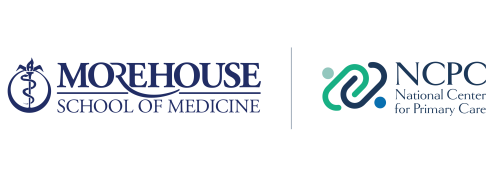You are looking at an archived version of our site. Please visit thepcc.org for a fresh, new experience!
You are here: Array » Executive Member Spotl ...
Executive Member Spotlight: Morehouse School of Medicine - National Center for Primary Care
Editor’s note: The COVID-19 pandemic and this summer’s protests against police brutality have elevated the national conversation on racial injustice and how it manifests in economic and health inequities in communities of color. The Black community has suffered disproportionately from the pandemic and from centuries of racism entrenched in our country’s economic and health systems. As a result, this month we are recognizing a PCC member that has roots in the Black community and whose work focuses on health equity.
The Morehouse School of Medicine - National Center for Primary Care has been a PCC Executive Member since September 2015. The School of Medicine, located in Atlanta, was started as the Medical Education Program at Morehouse College, one of the country’s 107 historically Black colleges and universities. In 1981, the School of Medicine became independent from the college.
History of the National Center for Primary Care
The School of Medicine established the center in 1997 with funding from Congress and under the leadership of Dr. Louis Sullivan, former Secretary of the U.S. Department of Health and Human Services and President Emeritus of the School of Medicine. It became the first congressionally sanctioned center to develop programs that strengthened the primary care system for health equity and sustainability. Over the years, the center has had many prominent leaders, including David Satcher, MD, PhD, former U.S. Surgeon General, who became director in 2002.
Main purposes
The center has become the umbrella for the programs that are currently focusing on community-oriented prevention and primary care for low-income minority and other underserved populations. Its main work is in four areas:
- Substance use, prevention and treatment, which focuses on treatment practices and assisting practitioners and pre-service professionals in local communities
- Health information technology, which focuses on small, rural practices and those serving underserved communities
- Research, which uses a health equity lens to measure the impact of the primary care system on patient outcomes
- Health policy, which addresses health equity policy gaps
New work: Mitigating the impact of COVID-19 among racial and ethnic minorities
In late June, the School of Medicine was awarded a $40 million grant to fight COVID-19 in racial and ethnic minority, rural and socially vulnerable communities by the U.S. Department of Health and Human Services Office of Minority Health (OMH). The grant will fund an initiative to coordinate a strategic network of national, state, territorial, tribal and local organizations to deliver COVID-19-related information to communities hardest hit by the pandemic.
The initiative – the National Infrastructure for Mitigating the Impact of COVID-19 within Racial and Ethnic Minority Communities (NIMIC) – is a three-year project designed to work with community-based organizations in their efforts to link communities to COVID-19 testing, health care and social services. This effort will also foster the sharing and implementation of effective response, recovery and resilience strategies.
“This work will create the opportunity to measure the effectiveness of interventions being deployed to mitigate the impact of COVID-19. The results of which should lead to a new found knowledge base to better prepare for and respond to future pandemics, especially in vulnerable communities,” MSM President and Dean Valerie Montgomery Rice said. “The adoption and adaptation of these interventions to vulnerable communities creates a new paradigm for the creation of health equity.”
To mitigate the impact of COVID-19 on racial and ethnic minority, rural, and socially vulnerable populations, the medical school will establish the National COVID-19 Resiliency Network. Dominic Mack, MD, director of the National Center for Primary Care, and Daniel E. Dawes, JD, director of the Satcher Health Leadership Institute, will co-lead the network.
Republished from the August 2020 Executive Member Update (monthly e-newsletter)

Recent News
August 16, 2024
August 12, 2024
July 16, 2024
May webinar highlights: “The Commercial Market: Alternative Payment Models for Primary Care” Nate Murray explains w… https://t.co/KX9Wi2w6oY —
Il y a 2 années 8 mois
@CMSinnovates’ primary care strategy is rooted in a 2021 @theNASEM’s report which called #primarycare “foundational… https://t.co/glbPxvCysg —
Il y a 2 années 8 mois
@CMSinnovates has a new #primarycare strategy, envisioning “ACO-based primary care model tests that may focus on pr… https://t.co/aJGF1z411l —
Il y a 2 années 8 mois
- Page 1
- ››
Secondary menu
Copyright © 2024 Primary Care Collaborative




